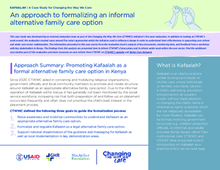This case study, developed by an external evaluation team as part of the Changing the Way We Care (CTWWC) initiative’s five-year evaluation, examines efforts in Kenya to promote and formalize Kafaalah, an Islamic practice similar to long-term foster or kinship care, as a recognized alternative family care option. Since 2020, CTWWC has collaborated with religious leaders, government officials, and communities to build awareness, create legal and regulatory structures, and support national and local implementation of Kafaalah. Traditionally practiced informally and outside of social service oversight, Kafaalah placements often lacked proper monitoring and safeguards for children’s best interests. Through its work, CTWWC aimed to raise community understanding, establish legal frameworks, and disseminate national guidance, positioning Kafaalah as a culturally appropriate, family-based alternative to institutional care in Kenya.
See also:
- Final Report: Changing the Way We Care; Year 5 Evaluation
- Moldova Case Study: An approach to collectively design a strengthened social service workforce
- Guatemala Case Study: An approach to building local government involvement in family strengthening
- Case Study: An approach to building consensus, collaboration, and scale: the Transforming Children’s Care Collaborative (in partnership with the Better Care Network)

